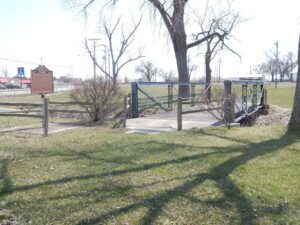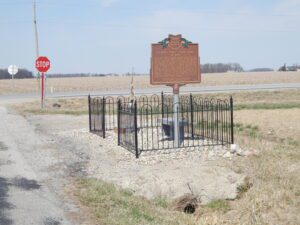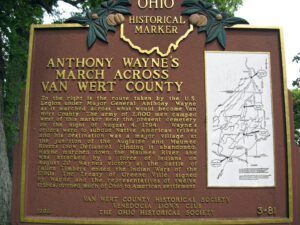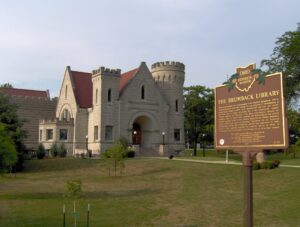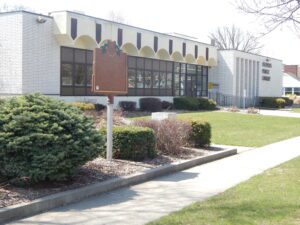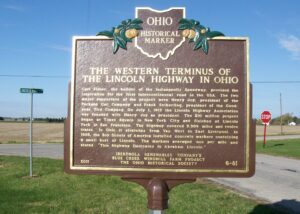, OH
Built in 1894 at a cost of $575, this bridge spanned Town Creek at Hoghe Road (Township Road 82) for 100 years. The Van Wert County Commissioners approved the bridge’s construction in response to requests from the Cincinnati, Jackson & Mackinaw Railroad Company. The span is an example of the truss-leg bedstead design. It was intended to handle heavy loads traveling to and from area railroad tracks, which were less than a mile from the bridge’s original location. The bridge was removed from Hoghe Road in 1994. The Van Wert County Engineer’s Department rehabilitated the bridge and, with the permission of the Van Wert County Agricultural Society, relocated it to the county fairgrounds in 1997.
, OH
One of Ohio’s greatest manhunts ended here on the morning of July 23, 1948. Robert M. Daniels and John C. West, parolees from the state prison in Mansfield, had gone on a killing spree that left six people dead. Driving west on U.S. Route 224 in a stolen auto transport truck, the pair approached this intersection and encountered a roadblock. It was manned by Van Wert County Sheriff Roy Shaffer, Frank Friemoth, the county game warden, and Sergeant Leonard Conn of the Van Wert city police. West was driving the truck; Daniels was asleep in a car overhead. As Sheriff Shaffer climbed onto the truck and apprehended Daniels, West leaped from the cab and shot Conn in the chest and Friemoth in the arm. Conn returned fire and killed West. The officers survived their wounds. Daniels was convicted, sentenced to die, and electrocuted at the Ohio Penitentiary in Columbus on January 3, 1949. This marker pays tribute to all law enforcement officers who risk their lives to protect the citizens of their communities.
, OH
To the right is the route taken by the U.S. Legion under Major General Anthony Wayne as it marched across what would become Van Wert County. The army of 2,800 men camped west of this marker near the present cemetery on the night of August 4, 1794. Wayne’s orders were to subdue Native American tribes and his destination was a major village at the junction of the Auglaize and Maumee Rivers (now Defiance). Finding it abandoned, Wayne marched down the Maumee River and was attacked by a force of Indians on August 20. Wayne’s victory at the Battle of Fallen Timbers ended the Indian Wars of the 1790s. The Treaty of Greene Ville, signed by Wayne and the representatives of twelve tribes, opened much of Ohio to American settlement. Side one includes a map on the right hand side of the marker showing the route of Wayne’s army through the eastern third of Van Wert County.
, OH
When local banker and businessman John Sanford Brumback left a large bequest to Van Wert County for the purpose of establishing a countywide library in 1897, such institutions did not yet exist, and Ohio had no legal provision for a tax-supported county library system. In response, the Ohio Legislature passed an enabling law in April 1898, marking the beginning of the county library system in the United States. Designed by Toledo architect David L. Stine and built of Bedford limestone in an eclectic Romanesque style, the Brumback Library was dedicated in 1901. Added to the National Register of Historic Places in 1979, it continues to serve as a center of knowledge for all of Van Wert County.
, OH
A farm boy with a tenth grade education, Leslie Peltier, born near Delphos in 1900, achieved fame as one of the most famous astronomers of the twentieth century. In 1916, he raised $18 dollars by picking 900 quarts of strawberries on his father’s farm in order to purchase his first telescope. His stargazing abilities led Harvard Observatory’s Dr. Harlow Shapley to proclaim him “the world’s greatest non-professional astronomer.” During his 65 years of stargazing, Leslie Peltier discovered 12 comets and two novae and made 132,000 variable star observations. Peltier made his discoveries on his homemade “merry-go-round” observatory that rotated on a child’s merry-go-round track and housed the optics from a 6-inch, f/8 telescope on loan from Princeton University. To recognize his achievements, the Astronomical League created the annual Leslie C. Peltier Award in 1980 to recognize an amateur astronomer who contributed to astronomy observations of lasting significance.
, OH
This is the gravesite of Robert Nesbitt, an immigrant from Convoy, Ireland who named Convoy, Ohio after his home town. In 2010, the Convoy Community Foundation, Convoy Lions Club, Convoy Business Association, and Convoy Community Days, Inc. raised the funds to restore Nesbitt’s tombstone. A representative from Convoy, Ireland – Ray Bonar – attended the rededication ceremony on July 4, 2010. The Van Wert County Historical Society took over the care of the grave site, which is in the Sugar Ridge Cemetery. The cemetery has been under the care of the Tully Township Trustees since its foundation.


